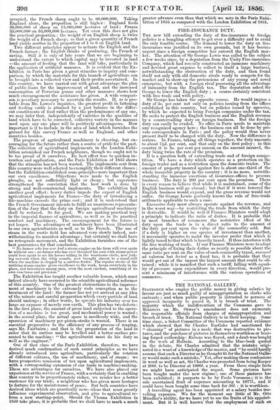FIRE-INSURANCE DUTY.
THE new bill extending the duty of fire-insurance to foreign policies is a bungling attempt to get over a difficulty and to avoid the only feasible course. The demand to lower the duty on fire- insurances 'was justified on its own grounds, but it has become urgent since a foreign competitor has entered the English mar- ket. The attention of Sir George Lewis was called to the subject a few weeks since, by a deputation from the Unity Fire-insurance Company, which had recently constructed an immense machinery and devoted great expense to collect to itself a large business, notwithstanding the obstruction of the duty, and then found itself not only with old domestic rivals ready to compete for the market and to show-up the pretensions of any young and novel enterprise, but with a foreign rival possessing all the advantage of immunity from the English tax. The deputation asked Sir George to lower the English duty ; a course certainly consistent with free trade and with policy. Sir George has taken the opposite course. He would impose a duty of 3s. per cent not only on policies issuing from the offices established in this country, but on policies issued by agencies, by which he expected to bring Foreign companies under the tax. He seeks to protect the English business and the English revenue by a countervailing duty on foreign business. But the foreign duty can easily be evaded. No office in Paris needs to maintain any recognized agency here ; the business can all be done by pri- vate correspondents in Paris ; and the policy would thus never present itself to be charged with the duty. Now the difference is serious. In France, taking all things together, the duty amounts to about 70. per cent, and that only on the first policy; in this country it is 38. per cent per annum on the amount insured, the duty being twice the rate of the premium. It is a question both of extending trade and of foreign compe- tition. We have a duty which operates as a protection on the foreign trader and as a restriction upon the domestic trader. The amount of property insured against fire is about one-third of the whole insurable property in the country ; it is no more' notwith- standing the immense exertions of insurance-offices to procure business. The duty is 200 per cent upon the premium. There is every reason to believe that while it is maintained, some of the English business will go abroad ; but that if it were lowered the English business would expand, and the gross revenue would not suffer. Sir George Lewis perfectly knows the rule of free-trade arithmetic applicable to such a ease. Excessive duty must always operate against the revenue, and in the worst way—by restricting the frade from which the duty is derivable. It would be well if Finance Ministers could adopt a principle to indicate the ratio of duties. It is probable that in most branches of commerce the restrictive effect of the duty upon the trade is in a direct ratio to the amount of the duty per cent upon the value of the commodity sold. But if a duty is higher on one species of investment another, it necessarily operates to make the invester prefer that which is lightly taxed to that which is heavily taxed. It thus interferes with the free working of trade. If our Finance Ministers were to adopt the principle of fixing their duties as nearly as possible about the same ratio per cent on the value of each commodity taxed, assessed ad valorem but levied as a fixed tax, it is probable that they would get out of the impost the largest amount that could. be ob- tained ; while it is manifest that such a tariff, falling with equal- ity of pressure upon expenditure in every direction, would pre- sent a minimum of interference with the various operations of commerce.


























 Previous page
Previous page